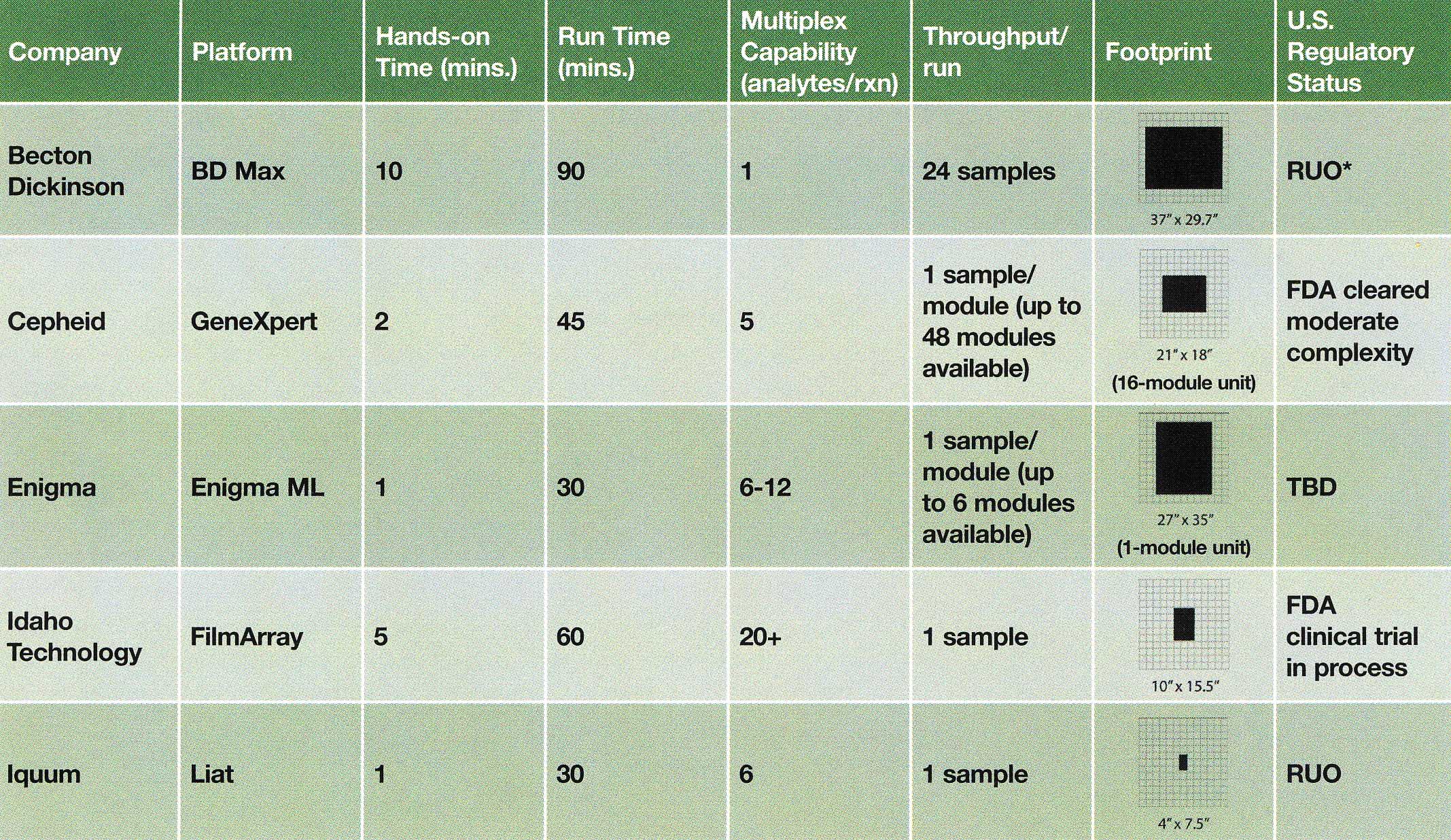New Load-and-Walk-Away Systems Promise Rapid Turnaround Times and Multi-Target Testing
Laboratory Automation is one important reason why more community hospital laboratories and local pathology groups can now perform a growing menu of molecular diagnostic tests. Rapid innovations in automation technology now make it possible for even low-volume medical laboratories to perform molecular testing using highly-automated “load and walk away” molecular analyzers.
Pathologists and clinical laboratory managers may be surprised to learn that the market for these simple-to-use automated analyzers is actually becoming crowded. There are at least five companies that now make bench top automated nucleic acid testing systems. These systems are designed to enable medium and low volume labs to compete in the nucleic acid testing arena. It is one reason why the number of community hospital laboratories and local anatomic pathology group practices are establishing molecular testing programs.

Clinical Laboratories Like These Small Footprint Fully-Automated MDx Solutions
For a molecular diagnostic (MDx) platform to be considered fully automated, it must integrate these capabilities: preparation of samples, signal or target amplification, detection (typically fluorescence), and the presentation of the test results—typically delivered either in print, electronic or wireless formats—without any additional input from the user.
“Two positive trends are occurring in nucleic acid testing,” wrote Carl T. Wittwer, M.D., Ph.D., Professor of the Department of Pathology at the University of Utah School of Medicine, in his article titled “Fully Automated MDX,” published in ADVANCE for Administrators of the Laboratory, “One is to provide more information on each sample, including testing for multiple organisms in infectious disease. The other,” he added, “is to provide more timely results for personalized care.”
Large-footprint fully automated nucleic acid testing platforms have been around for several years. Their significant cost has generally limited their use to high volume clinical laboratories, where these MDx testing platforms can be used in a cost effective manner. That was why these larger, automated systems were out of reach for most medium to low volume medical laboratories.
Today, a growing class of smaller footprint MDx systems have emerged. These analyzers are capable of fully automated nucleic acid testing, including sample prep and rapid turnaround time (generally 30 to 90 minutes). The systems Wittwer discussed in detail in his article are:
- Becton Dickinson’s BD Max ( NYSE:BDX )
- Cepheid’s GeneXpert ( NASDAQ:CPHD )
- Enigma’s Enigma ML
- Idaho Technology’s FilmArray
- Iquum’s Liat
According to Wittwer, these MDx platforms “use disposable cartridges for sample preparation, and contain processing in a closed system.”
New Systems Require Minimal Expertise to Operate Reducing Labor Costs
Traditional MDx platforms require a trained technologist to extract the nucleic acid, set up the assay, analyze the data, and troubleshoot the system when errors arise. Conversely, the new “load and walk away” MDx systems can be operated with minimal expertise, and, in addition, on-board computer analysis virtually eliminates the subjective interpretation of the results. The systems also are closed to outside contaminants and require little troubleshooting on the part of the operator.
“Although no system is CLIA waived, and several are yet to be evaluated by the FDA, automated nucleic acid testing is nearing the point of care,” wrote Wittwer, “Personalized medicine is greatly aided by automation that integrates sample preparation, amplification and detection, enabling clinical decisions in minimal time.”
Just as there is a race to be first to complete a whole human genome sequence for a cost of $1,000 or less, so also is there a race to expand the clinical laboratory market demand for molecular diagnostic testing systems by developing self-contained analyzers which are smaller and cheaper—yet can produce test results of equal quality to their bigger brothers. That bodes well for pathologists and clinical laboratory managers working in community hospitals and local pathology groups, since it will make it economically and technically feasible for these smaller labs to offer an ever more sophisticated menu of nucleic acid tests.
Related Information:
BD Announces European Launch of the BD MAX™ System for Molecular Diagnostics
Detection of 16 Respiratory Viruses using an Automated, Nested Multiplex PCR Platform




